The Role of Chess and Creativity in Modern Education
In such a dynamic and changing landscape of modern education, there is a need for seeking new approaches to teaching. That has made educators continuously look out for new avenues to cultivate skills like critical thinking, problem-solving, and creativity among learners. One important, maybe somewhat underestimated, tool in this search is chess. Renowned for its strategic complexity and intellectual rigor, chess has proved a perennial mainstay in the fostering of mental acuity. However, newer trends in education refresh this ever-relevant game for a much deeper, subtler reason: the profound potential to improve one’s creativity.
The interplay between chess and creativity is an approach to learning where strategic thinking aligns with imagination in problem-solving. Rather than the usual mere memory work, chess encourages students to go deep into analysis, foreseeing outcomes that may potentially arise, and strategizing uniquely—elements now directed toward creative thinking. By introducing chess into educational curriculums, a platform for exploring creative potentials will be provided to students while enhancing their cognitive skills.
The effectiveness of chess in enhancing creativity has been shown by a large number of studies and educational projects all over the world. For example, it has been noted that during regular chess games, students develop better abstract thinking, gain problem-solving skills, and increase innovative thinking. These skills were not only important at school but also in personal and professional growth in the world that keeps changing at high speed.
Implementing chess in schools is relatively easy, and the formats are very diverse. It would range from extracurricular activities like chess clubs or circles to including chess-based lessons as part of regular schooling. Inclusion within digital chess platforms raises this potential for access, allowing students to practice, play with students from other countries worldwide, and open their horizons to so many strategic styles.
The relationship of chess to creativity is much more than an academic curiosity; rather, it provides a practical and effective approach toward modern education. Through chess, educators can create a new wave of students who would be intellectually sound but equally creative. This double power gives learners the capability and skill to face all sorts of complex challenges in real life with unique solutions that are coupled with strategic direction.
In this article, we focus more on the cognitive benefits of chess, its role in creativity enhancement, and exactly how to integrate it into educational frameworks. Recognizing and utilizing this nexus between chess and creativity will redefine the teaching-learning matrix and usher in a more innovative and resilient future generation.
- Why is chess considered beneficial for education?Chess is beneficial for education because it promotes critical thinking, problem-solving skills, and creativity. It requires strategic planning, abstract reasoning, and the ability to anticipate and adapt to different scenarios, all of which are valuable skills for academic and personal development.
- How does chess foster creativity in students?Chess fosters creativity by encouraging players to think outside the box, develop innovative strategies, and approach problems from different angles. The game requires imagination, visualization, and the ability to create and execute unique plans to achieve strategic goals.
- What are the long-term benefits of learning chess in education?Learning chess in education provides long-term benefits such as improved problem-solving abilities, enhanced strategic thinking skills, increased confidence in decision-making, and preparation for future academic and career challenges that require creativity and analytical thinking.
- What social and emotional skills can students develop through chess?Through chess, students can develop social skills such as sportsmanship, teamwork, and collaboration. It also enhances emotional skills like resilience, patience, and perseverance, as players learn to cope with wins and losses and strive to improve their skills over time.
The Cognitive Benefits of Chess
While chess is heralded for its historical and intellectual values, its impact extends beyond the 64 squares. It is, in effect, a very powerful instrument of cognitive development with multiple mental benefits that prove to be a great help in educational institutions. Through chess, students can develop their intellectual capacities in areas which the traditional activities within the classroom may not be able to engage fully. Here, we have been in a position to discuss how chess has multi-faceted cognitive benefits and can help in playing a significant role in the developing minds of young people. Improved ability to focus and concentrate:
An immediate benefit of playing chess is a manifold increase in concentration and focus. While playing chess, one needs to focus upon his moves, strategies that could be adopted by opponent and what would happen a few steps ahead. Such intense focus helps children improve their attention span and sustain their focus for a longer period. This ability carries over to other academic areas where it is important to sustain attention.
-
Develops problem-solving skills
Chess, intrinsically, is a game of problems solved. Every move presents a new challenge that is to be made, and this has to be done with utmost scrutiny and strategy. Players must think critically about their position, figuring out the opponent’s responses and developing imaginative solutions to give them an upper hand in the game. This continual procedure of problem identification and strategy formulation to solve those problems sharpens and refines students’ problem-solving skills toward complex issues both inside and outside of the classroom.
Improved Memory and Retention of Information: Chess is a game that involves memory. The player must keep in mind various strategies and openings, among other things, during gameplay. This constant exercising of one’s memory has effects that also spill over to enhance both short- and long-term information retention. In this regard, students who regularly play chess demonstrate comparative better memories, which may further translate to learn and retain information on subjects other than chess.
-
Logical and Analytical Thinking Development
Chess requires a high degree of analytical and logical thinking. Players have to look at several possibilities, consider the different pros and cons of any move, and think of the best action. This process of analytical thinking is quite similar to solving mathematical problems or working on some scientific investigation. Hence, such skills developed in chess help students enhance their logical thinking towards making fully reasoned decisions for any subject they study.
-
Improved Spatial Reasoning
Spatial reasoning is the ability to manipulate any object in space or visualize its transformation. Chess players apply this all the time to monitor the placement of various pieces on the board, envision moves, and calculate strategy. This can be very effective in areas of mathematics, engineering, and science that require spatial perception. Playing chess can help students reinforce their spatial reasoning, which in turn enables them to perform better in such subjects.
-
It helped to foster creativity and imagination.
While chess is normally considered to be a game of logic and strategy, it is also very spontaneous. It requires large amounts of creativity and imagination to construct diverse strategies and outrank opponents in the game. This creative aspect of thinking in chess will let the student learn how to approach problems differently and come up with unique solutions, hence developing the habit of creative thinking in other fields of study and in real life.
-
Greater Patience and Discipline
Chess is a game of serenity and self-control. It teaches players to be cool-headed and composed at all times, even under much pressure during the game. The player will learn to be patient and not act impulsively but wait for the right moment to carry out the strategy. This virtue of patience and self-control should be able to help learners deal with stress, focus on long-term goals, and work through difficulties.
-
Improved Cognitive Flexibility
Cognitive flexibility involves adjusting to a new situation, switching from one task to another, and keeping several concepts simultaneously in working memory. In chess, one has to constantly modify plans for the game in terms of opponents’ responses to moves and the developing state of that game. Through this mechanism, the demand for constant modification or adjustment of a plan strengthens cognitive flexibility, enabling the student to better cope with unexpected changes and manage multiple tasks at the academic and personal levels.
-
Improved Executive Function
Executive function is the umbrella term for several higher-order processes involved in controlling cognition, such as planning, decision-making, and impulse control. Chess requires executive function at a very high order, as one needs to plan and strategize subsequent moves and not act impulsively to commit an error. Playing chess more and more is likely to develop these executive functions more, thus improving organizational skills, time management, and decision-making. Improved academic achievement
The cognitive advantages further diffuse into improved performances in schools. A number of studies have indicated that students who play chess often perform well in mathematics and reading. In fact, the skills acquired through chess have direct relevance to academic success and include problem-solving, critical thinking, and enhancement of memory. Very often also, schools that have incorporated chess into their curriculum report improved overall student achievement and engagement.
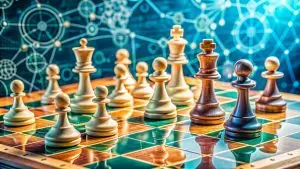
Chess and Creativity: The Connection
The relationship between chess and creativity is complex, nuanced, and interesting; it shows how a game classically associated with logic and strategy will turn out to be one of the deepest catalysts for creative thinking. While the game of chess is customarily looked upon as structured and rule-bound, containing elements of competition, the potential it holds for fostering creativity is huge and worthy of attention. This very fact of connection between chess and creativity alone can change the orientation towards learning by opening up the chess platform as a unique platform for imagination and problem-solving thinking.
-
Development of Strategic Thinking
Basically, chess is a game of strategy; hence, players have to be very deliberate about each move and then make an attempt to forecast the action that the opponent would next take. There is inherent creativity in this strategic thinking by keeping on finding out new ways to outmaneuver opponents. It requires students to think strategically about many possibilities and outcomes. In contrast, with rote learning, the process of mechanical memorization is generally done without in-depth understanding. The process of thinking over various sets of possibilities and outcomes develops a person into being analytical and inventive, by exploring different pathways and solutions.
-
Abstract Thinking
The game of chess requires a high degree of abstract thinking. One needs to visualize the chessboard, predict moves, and envision the different scenarios that might emerge. This ability to think abstractly lies at the very core of creativity. Through this skill, students will be able to go beyond concrete and immediate ideas to consider those that otherwise might seem quite elusive, such as ideas and solutions. This could mean sacrificing a chess piece for some long-term strategic gain or working out a totally unconventional tactic to surprise the opponent in a game of chess. This kind of abstract thinking sustains creative problem-solving and allows students to apply it in so many different contexts: science, engineering, art, literature, etc.
-
Developing Lateral Thinking
Lateral thinking refers to an indirect and creative method of problem-solving. It often uses ideas not immediately related to or obvious to the situation. Chess is a great place to train for this kind of skill. Players often come up against unexpected moves from their opponents and need to think outside the box for a fitting response. This, therefore, creates the need for adaptation and innovation, which helps them cultivate flexibility of mind that will allow the student to approach problems from different angles and find unique solutions. Lateral thinking is a valuable asset in this fast-changing world where conventional methods may not suffice.
-
Inspiring Originality and Innovation
It fosters originality and innovation by allowing a player to come up with their own strategies and style of playing. Again, though there are openings and tactics, the most successful are those players who offer their unique touch of creativity while playing. This emphasis on originality builds confidence in students about their ideas and innovations. This, in a learning environment, is reflected in increased confidence to contribute new ideas, engage in creative projects, and provide fresh perspectives in discussions and group activities.
-
Developing Resilience and Perseverance
Creativity often means trying out and falling, and chess is a game that one gets to experience being resilient. One has to learn to get up from losses and failures by figuring out what went wrong and how to change the strategies. This process of learning from failure and persisting in the face of adversity is applied to creative endeavors because very few of life’s successful paths come in straight lines. Chess helps children develop the resilience and perseverance to go on refining ideas and approaches until successful solutions are found.
-
Building a Growth Mindset
According to psychologist Carol Dweck, a growth mindset refers to one in which people believe that abilities and intelligence can be developed through dedication and hard work. Chess would have to cultivate this kind of mindset since improvement happens, obviously, with practice and learning. The players see themselves visibly progressing as they study the game, practice new strategies, and learn from experience. This growth mindset helps to fall in love with learning and accept challenges; the two primary requirements for creativity. Students who develop this growth mindset are most likely to take intellectual risks and go after new ideas and persist in the face of challenges.
-
Fostering Interdisciplinary thinking
Chess remains beyond the boundaries of any single domain of knowledge. It pulls in mathematics, psychology, history, and art. This interdisciplinary nature of chess encourages students to connect knowledge acquired from many fields, fostering creativity in learners. For instance, the historical context of some famous chess games can be interpreted as a factor that led to cultural and strategic changes, whereas the inbuilt mathematical patterns in the moves of chess inspire an interest in solving problems with logical reasoning. This is one of the abilities developed by a holistic creative way of learning.
-
Fostering Creativity
One of the basic elements of creativity is imagination, and chess is one of the most productive areas for it. Chess is about scenarios of possible situations, anticipation of consequences, and trying different combinations. That sort of imaginative activity is not concentrated on the mental image of a chessboard; rather, it is like composition—stories and possible events in the game. Through training in imagination, chess opens new frontiers of thinking for students to progress beyond conventional boundaries of the mind in their intellectual and creative journey.
-
Setting a Collaborative Environment
While chess is mainly a competitive game, there are possibilities for collaboration in this game too—collective solutioning. For example, students in a classroom can work together while going through games or debating strategies and learn from others’ perspectives. This type of environment—collaborative—furthers the exchange of ideas where collective creativity is encouraged. Students will be able to enhance their creative thinking by sharing their thoughts and approaches toward the solution and gain deeper understanding in a wider perspective than just playing the game.
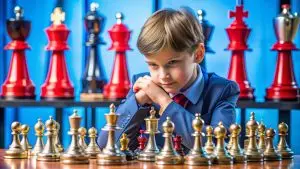
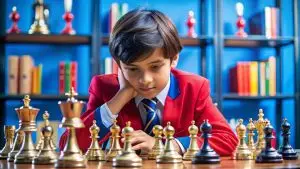
Implementing Chess in Education
This integration is therefore a strategic move that could benefit students, teachers, and schools. Aside from being known for its strategy and intellect, chess makes available many opportunities to enhance learning for students in different disciplines and foster key skills that are important for the development of learners’ academic and personal lives. This section discusses the practical issues in implementing chess in education—from setting up chess programs to the implementation of chess-based activities as part of classroom learning.
Setting up chess clubs and programs is one of the ways chess can be introduced into education, which may include extracurricular activities where students could acquire time to learn and practice chess in a very supportive and engaging environment. Chess clubs can be organized at various levels—elementary school to high school—and can accommodate students in varying skill levels, from the youngest novice player to advanced players. Such clubs will diffuse the game of chess among the students and also offer a sense of community and fraternity among the members.
-
Integrating Chess into the Curriculum
Beyond extracurricular activities, the potential is still there to be holding enrichment of learning experiences and enhancements of educational outcomes when chess is placed inside an academic curriculum. Educators can relate chess-based lessons and activities to mathematics, history, or even language arts by directly linking chess strategies to relevant academic concepts. Movements of chess pieces could illustrate geometric concepts, while famous chess games could show some historical events, thus having a meaningful and interdisciplinary learning experience for the children.
-
Digital Chess Platforms and Tools
Technology offers new ways to appeal to the learner in students for chess learning in this century. Online chess platforms and resources provide easily accessible opportunities to practice, learn different strategies, and have matches with students across the globe. These often include video lessons, problems, and interactive puzzles for learning, which can be tailored to the students’ skill levels, hence making it very appealing to chess study in and out of school. The digital tools may also carry out chess remote learning and provide the ability for students to participate in chess tournaments and also connect with other chess lovers across the world.
-
Organizing Chess Tournaments and Events
Chess tournaments or activities provide an excellent avenue for the students to portray acquired skills, build up self-confidence, and generate sportsmanship. Schools can thus invite students to take part in either inter- or intra-school chess tournaments with the view of having friendly competitions that reflect strategic capabilities. Tournaments not only encourage healthy competition among students but train them to set goals, practice incessantly to meet them, learning from failures and successes. Further, participation in chess activities brings along with it a sense of accomplishment and acknowledgement of the student’s effort, a step that further motivates him/her to continue learning chess.
-
Professional Growth of Teachers
To adequately infuse chess into learning, the teachers can be offered an opportunity for professional growth. This is by taking them through the strengthening of knowledge and pedagogies concerning chess. These trainings can be in workshops, seminars, and even online courses. It could provide educators with such professional development initiatives as resources, lesson plans, and instructional strategies particular to varied grade levels and learning goals. Equip schools with the tools and build confidence in teaching chess so they can provide a continuous, quality chess education experience for students.
-
Community Partners and Organizations
The chess experience can be further enhanced on behalf of students if the program collaborates with community partners and organizations. Local chess clubs, libraries, and chess enthusiasts can support the school’s chess programs by volunteering their expertise and mentorship. Such community partnerships also provide opportunities for children to take part in workshops, exhibitions, and other projects whereby they engage in promoting chess learning and activity. A school, through the building of such relations, establishes a supportive environment that engenders enthusiasm for chess and thereby contributes to the achievement of better learning outcomes among its learners.
-
Measurement and Evaluation of Impact
It is in the evaluation of the impact of chess on education that one is able to measure its effectiveness and make decisions on program development. To ascertain the impact that chess programs have, a school may engage in student performance assessments, questionnaires, and qualitative feedback from both teachers and students, and sometimes parents. Such data may be sourced from following up on changes in critical thinking, academic achievements, and children’s commitment; such information impacts the benefits from chess education. By gathering and analyzing data, schools will be in a position to enhance the chess programs from time to time in pursuit of reaching out to students’ changing needs and interests.
-
Advocacy for Chess Education
To win the support of the stakeholders, such as administrators in the school boards, policymakers, and parents, advocacy is a very key frontier in furthering chess education. Educators, students, and the community can promote chess education by highlighting its academic, social, and cognitive values. Success stories, research findings, and testimonials prove it has a definite positive effect on the development and successes of students in their education. The stakeholders developed in support of chess education will be capable of contributing toward growing and sustaining chess programs locally in schools and communities.
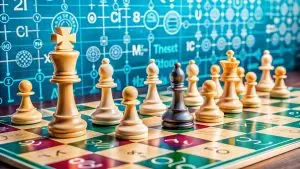
Success Stories and Research
Integrating chess into the school setting has been in the limelight for the positive development it brings to students in various cognitive, academic, and social domains. Success stories and research studies act as strong testimonies about how chess improves critical thinking, problem-solving, and overall academic performance. This section will delve into noted success stories and research findings that epitomize How Chess Enhances Academic Performance in Students.
-
Academic Performance and Cognitive Development
It has been discovered by many studies that chess participation correlates with improved academic performance. For instance, a study done by the University of Memphis reported that students who participated in chess programs had significant gains in mathematics and reading scores compared to their peers not active in chess activities. The skills developed from chess, particularly analysis and problem-solving, enhance cognitive abilities that transfer over into academic subjects.
In another study by Robert Ferguson and Alan T. Hsu, published in “Educational Research Quarterly,” findings showed that participation in chess positively impacted the spatial analysis abilities of students and their mathematical problems-solving skills. These cognitive benefits are attributed to mental stimulation derived from strategic thinking in playing the game, strengthening neural pathways and hence improving cognitive functioning over time.
-
Social-Emotional Skills
It develops social-emotional skills beyond the parameters of academic achievement. One’s sportsmanship, resilience, and teamwork will be boosted through chess playing, especially if one is engaged in chess clubs or even chess tournaments within their schools. Players will learn how to deal with victory and defeat, teaching emotional strength and perseverance.
One case study by the United Kingdom Chess in Schools and Communities found that the teachers reported an improvement in self-esteem, confidence, and social relations at school among pupils participating in chess programs. The teaming aspect that characterizes the chess tournaments and the friendly nature of chess clubs provide a sense of belonging and solidarity that shapes good social behavior and peer relationships.
-
Problem-Solving and Critical Thinking
For years, chess has been associated with increased and highly developed problem-solving and critical thinking. Players must look through complex situations, try to predict the actions of their rival, and come up with strategic plans several steps ahead. Mental calculation and decision-making of this nature strengthen the rooting of logical reasoning and foster the formation of analytical thinking skills in students, thus being very relevant in an academic setting and professional development.
According to research conducted by Dr. Stuart Margulies, a psychologist and chess researcher, chess players demonstrate higher orders of critical thinking, spatial reasoning, and pattern recognition than non-players. These additional cognitive skills enhance chess performance and translate into improved performances in other academic disciplines and real-life situations.
-
Behavioral and Attitudinal Changes
In addition, chess play has been related to positive behavioral changes and academic attitudes of students. Research has demonstrated that students involved in chess activities manifest an increased level of motivation, concentration, and self-discipline. The fact that tournaments in chess are structured and the game is goal-oriented will motivate the students to set goals, manage their time appropriately, and keep going until such targets are achieved.
In a longitudinal study, Dr. Robert Ferguson reported that chess participants indicated a higher degree of academic motivation and self-regulation than non-participants. This shows that chess programs not only enhance the skills related to academics, but also lead to the development of a positive attitude toward learning and attaining success in academics.
-
Applications to Life and Career Readiness
It is, therefore, the case that out of playing chess, one acquires the kind of skills that are quite relevant in application and making people ready for their careers. Chess participants are able to navigate complex challenges within various professional fields such as science, technology, engineering, mathematics, business, and the arts.
A study conducted by the Chess Academy of Norway shows that retired chess players dominate strategy-related careers that involve resourcefulness and analytical thinking. In fact, the kinds of skills developed in strategic thinking and adaptability provide chess players with the innovative thinking expected of leaders.
- What social skills can students develop through chess?Through chess, students develop social skills such as sportsmanship, teamwork, patience, and resilience, as they learn to cope with wins and losses and collaborate with peers.
- How does chess support emotional development in students?Chess supports emotional development by promoting resilience, perseverance, and self-confidence as students navigate challenges and strive for improvement in their gameplay.
- What long-term benefits does learning chess offer students?Learning chess offers long-term benefits such as improved problem-solving skills, enhanced strategic thinking abilities, increased self-discipline, and preparation for future academic and professional endeavors.
- How can parents support their child's interest in chess?Parents can support their child's interest in chess by encouraging participation in chess clubs or tournaments, providing access to chess resources and learning materials, playing chess together as a family, and fostering a positive attitude towards learning and competition.
Conclusion
The intersection of chess and creativity ushers in a new, excitingly transformative approach to modern education. Chess is a game that has great strategic depth and intensity of cognitive demand; hence, it’s much more than just a game—an instrument of creative thinking, intellectual growth, and problem-solving. Schools could tap the full potential within their children through chess’s integration into educational curriculums—moving minds that are sharp, strategic, yet innovative and creative.
Success stories and the findings of research make it quite obvious: chess develops important abilities that translate outside the classroom. Those young children who engage regularly in playing chess develop concentration, memory, and most importantly, creative thinking and the ability to look at problems from different perspectives.
A lot can be done towards this objective when educators and institutions look to the future and integrate chess at the very core of education. This assimilation of chess and creativity would lead to a dynamic pathway for academic excellence and holistic development, creating students into great thinkers, innovators, and leaders of tomorrow. By making chess a part of the learning journey, we not only will have enriched the educational experience but will have also opened a gateway toward a more creative, strategic, and resilient generation.
Add chess to your arsenal of learning tools today, and watch in wonder as it works its magic on student creativity and academic achievement. The game of kings builds a generation of creative problem solvers who are always ready to take up any challenge at a moment’s notice, armed with strategy and innovative thinking.
Pressed for time or prefer listening? You can listen to the podcast version of this article instead! Just click below to hear the content narrated for your convenience :

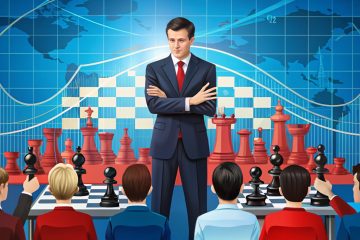

0 Comments